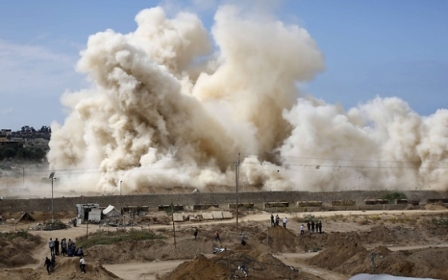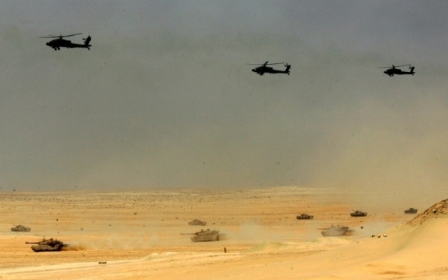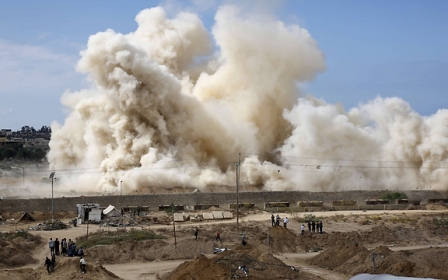Sinai’s al-Arish is like ghost town after latest attack

AL-ARISH, Egypt – Only those who are packing to leave can be found in the streets here today.
Young people who sometimes play football in the street during curfew hours are gone. Hidden shops selling emergency goods are closed. Only the sound of echoing Kalashnikovs and machine guns can be heard.
A day after attacks claimed by Welayat Sinai (formerly Ansar Beit al-Maqdis) killed at least 30 soldiers and injured at least 15 residents, including a 15-day-old baby, locals right now whisper to one another that it feels too risky to stay here any longer.
“After what happened, we can’t live here anymore,” one resident told MEE, as they prepared to pack their belongings into a truck and move their family. “Actually, there is no life here. It’s like a suspended life. You’re waiting for death at any time.”
Explosions, shooting, shrapnel
On Thursday night, around 8.30pm, houses in al-Arish shook with a terrifying blast. A suicide bomber apparently drove a water tanker fully loaded with explosives past the al-Arish Museum into the area’s main military camp known as Battalion 101.
Once the tanker was at the heart of the military camp, it blew up. Tens of military personnel, from soldiers to high-ranking personnel, were killed in the attack that sent flames and smoke into the air, visible from as far away as Rafah, 40 kilometres from here.
The explosion in Battalion 101 was followed by shelling which hit a hotel where military personnel stay and the North Sinai security directorate.
Around the same time as the explosion, militants killed several military personnel and two six-year-old children in five other attacks on checkpoints in North Sinai, including in western and southern Rafah, as well as a military camp in Sheikh Zuwaid.
Thousands of civilians live in the suburb around the battalion, and have grown accustomed to the sounds of gunfire day and night. At least 15 residents were injured on Thursday, hit with shrapnel coming from both inside and outside their homes.
Because the attacks happened after curfew, the injured were at first unable to use their cars or leave their homes to go to the hospital. Eventually, governorate police forces allowed through ambulances to carry people to al-Arish Public Hospital.
Among the at least 15 civilians who arrived at the hospital with injuries was Judy Ahmed, born 15 days earlier, who is now on a breathing machine, and a man whose eye had exploded after being hit with shrapnel.
‘Hell-like’
Officers who survived the attack described a catastrophic, “hell-like” scene in which some 12 charred corpses were left unidentifiable.
Others said the scene was reminiscent of the 1967 war between Israel and Egypt, Syria and Jordan which saw fighting in Sinai, which Israel eventually captured, and later withdrew from after the Camp David Accords. Women and children, eyewitnesses said, screamed and cried through Thursday night, and wary residents lay awake out of fear.
Located inside the al-Arish suburb of Dhahyat Alsalam, Battalion 101 – which houses key security and administrative buildings in Northern Sinai - is normally seen as a very secure area, cordoned off by sand piles and cement blockades, and protected by guards at several towers equipped with machine guns.
But Thursday’s attack was not customary: it was the biggest attack in the Sinai Peninsula since more than 30 Egyptian soldiers and officers were killed and another 30 injured in the 24 October bombing at the Karm al-Qawadees military check point near the town of Sheikh Zuwaid and a second attack at an al-Arish checkpoint.
Militant mindset
Coming after the government-imposed curfew, put in place in the North Sinai after the 24 October attacks, Thursday’s strike suggests the militants are well-organised and may have been attempting to avoid civilian casualties.
However, with the curfew in place and people facing penalties, and potentially death, by leaving their homes, hospitals had to put out urgent calls for blood donations, so the timing may, in fact, be less relevant to understanding the militants’ mindset.
Late Friday, the Sinai-based group formerly known as Ansar Beit al-Maqdis, but renamed Welayat Sinai after reportedly swearing allegiance to the Islamic State group, claimed responsibility for the attacks on Twitter.
In the streets of Arish, covered in glass and smashed up furniture, the road into Dhahyat Alsalam was closed with cars having to navigate around the camp. The feeling of a ghost town prevailed as families hurried to pack their luggage and leave the city before curfew began again.
New MEE newsletter: Jerusalem Dispatch
Sign up to get the latest insights and analysis on Israel-Palestine, alongside Turkey Unpacked and other MEE newsletters
Middle East Eye delivers independent and unrivalled coverage and analysis of the Middle East, North Africa and beyond. To learn more about republishing this content and the associated fees, please fill out this form. More about MEE can be found here.




